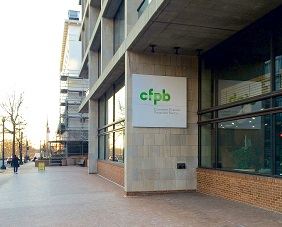Newsroom
CFPB's Uejio provides bureau update, vision in new letter
 In a letter to the CFPB's Division of Research, Markets, and Regulation (RMR), Acting Director Dave Uejio provided an update on bureau activities and shared his vision for the coming months, stressing the need for sharpening focus on the consumer experience. Uejio touched on a number of credit union issues in the letter, including those related to data collection under the Home Mortgage Disclosure Act (HMDA), qualified mortgage (QM) and debt collection rules, and a rulemaking on mortgage servicing.
In a letter to the CFPB's Division of Research, Markets, and Regulation (RMR), Acting Director Dave Uejio provided an update on bureau activities and shared his vision for the coming months, stressing the need for sharpening focus on the consumer experience. Uejio touched on a number of credit union issues in the letter, including those related to data collection under the Home Mortgage Disclosure Act (HMDA), qualified mortgage (QM) and debt collection rules, and a rulemaking on mortgage servicing.
Uejio previously published a blog outlining "the new priorities and focus of the CFPB," which include relief for consumers facing hardship due to the coronavirus pandemic and economic crisis, and racial equality, and flagged some concerning examination findings related to mortgage and student loan forbearance, payment deferments, PPP, and other CARES Act provisions.
"Our focus is and should be preventing harm, particularly to the most vulnerable among us. Doing this great work—of ensuring competitive, transparent, and fair markets for everyone, as mandated by the Dodd-Frank Act—will take all of us working together," wrote Uejio in the letter.
The immediate steps that Uejio asked RMR to take, by authorizing use of the bureau's data collection authority, include:
- preparing an analysis on housing insecurity, including mortgage foreclosures, mobile home repossessions, and landlord-tenet evictions;
- preparing an analysis of the most pressing consumer finance barriers to racial equity to inform research and rulemaking priorities;
- explicating include the racial equity impact of the policy intervention in policy proposals; and
- resume data collections paused at the beginning of the pandemic, including HMDA quarterly reporting and the CARD Act data collection, as well as the previously completed 1071 data collection and the ongoing PACE data collection.
On QM, NAFCU has continuously highlighted credit unions' concerns, previously urging the bureau to adopt a definition that would include a modified DTI threshold and allow for compensating factors. The association also recommended increasing the safe harbor threshold to 200 basis points and increasing the smaller loan pricing threshold for manufactured housing. In addition, NAFCU has also called for a further extension of the government-sponsored enterprise (GSE) patch. More on the issue and NAFCU's advocacy efforts.
Uejio also asked RMR related to the mortgage servicing rulemaking on pandemic response to avert – to the extent possible – a foreclosure crisis when the pandemic forbearances end in March and April, and to explore options for preserving the status quo with respect to QM and debt collection rules.
Additionally, Uejio highlighted that RMR has been given "the support it needs to implement section 1071 of the Dodd-Frank Act without delay," which is related to small business lending data collection.
NAFCU has long called for the bureau to exclude credit unions from the rulemaking noting the member business lending constraints credit unions face and the increased costs to implement the data collection. The bureau's current outline of proposals does not include this explicit exemption.
Should the bureau proceed with the rulemaking, NAFCU in December urged the agency to provide a more transparent assessment of exemptive relief options using expanded transactional and asset-based thresholds.
NAFCU has been working closely with the CFPB and will continue to engage to ensure credit unions are not overly burdened by rules that are intended to stop bad actors and are able to access tools to help their members through the pandemic.
Share This
Related Resources
Add to Calendar 2024-06-26 14:00:00 2024-06-26 14:00:00 Gallagher Executive Compensation and Benefits Survey About the Webinar The webinar will share trends in executive pay increases, annual bonuses, and nonqualified benefit plans. Learn how to use the data charts as well as make this data actionable in order to improve your retention strategy. You’ll hear directly from the survey project manager on how to maximize the data points to gain a competitive edge in the market. Key findings on: Total compensation by asset size Nonqualified benefit plans Bonus targets and metrics Prerequisites Demographics Board expenses Watch On-Demand Web NAFCU digital@nafcu.org America/New_York public
Gallagher Executive Compensation and Benefits Survey
preferred partner
Gallagher
Webinar
Add to Calendar 2024-06-21 09:00:00 2024-06-21 09:00:00 The Evolving Role of the CISO in Credit Unions Listen On: Key Takeaways: [01:30] Being able to properly implement risk management decisions, especially in the cyber age we live in, is incredibly important so CISOs have a lot of challenges here. [02:27] Having a leader who can really communicate cyber risks and understand how ready that institution is to deal with cyber events is incredibly important. [05:36] We need to be talking about risk openly. We need to be documenting and really understanding what remediating risk looks like and how you do that strategically. [16:38] Governance, risk, compliance, and adherence to regulatory controls are all being looked at much more closely. You are also seeing other technology that is coming into the fold directly responsible for helping CISOs navigate those waters. [18:28] The reaction from the governing bodies is directly related to the needs of the position. They’re trying to help make sure that we are positioned in a way that gets us the most possibility of success, maturing our postures and protecting the institutions. Web NAFCU digital@nafcu.org America/New_York public
The Evolving Role of the CISO in Credit Unions
preferred partner
DefenseStorm
Podcast
AI in Action: Redefining Disaster Preparedness and Financial Security
Strategy
preferred partner
Allied Solutions
Blog Post
Get daily updates.
Subscribe to NAFCU today.
